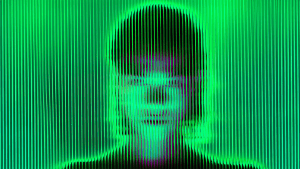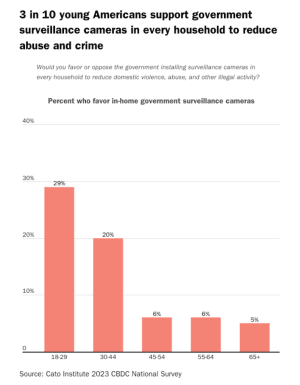Little Brother: How Digital Technology Normalises Surveillance For Young People
February 04, 2024 / Cameron Lee
Mass surveillance is bad.
This isn’t a controversial statement, but recent research indicates that attitudes towards being tracked and monitored may be shifting sharply in ways that have troubling implications for our future. You may assume that young people are less likely than their parents to trade freedom for security. But growing up in a world where behaviour is constantly tracked by the technology that they use in their day-to-day lives may be creating a generation that’s desensitised to mass surveillance — so much that they actively support it, even in its most dystopian forms.
When American Baby Boomers were growing up, being monitored by the government meant G-Men outside your house in a fake flower delivery van, and the countries largest companies traded in steel and oil. Things have changed. In your pocket right now, there is probably a camera and a microphone which is capable of pinpointing your exact position, anywhere on Earth. The largest American companies now trade in personal, behavioural information collected by these devices.
Over the last 40 years, there has been a tectonic shift in our society. The integration of digital technology into every aspect of our daily lives has, for the first time in human history, made constant mass surveillance possible. The onus is now on the users of this technology to try and claw back their privacy through the use of specialised tools (like Session) which protect them from the threat of prying eyes and the omniscient data-harvesting tentacles of surveillance capitalism.
What must it be like to have only ever known this brave new world? How must it affect your attitude towards being watched? If you have been watched, listened to, tracked, monitored, profiled and commodified from birth, are you more likely to reject this kind of treatment as you grow old enough to walk the halls of power? Or are you less likely to value and fight for the fundamental right to privacy.
Watch Me Whip… Now Watch Me Nae Nae
New research by the CATO Institute has shed light on this trend, and the results are disturbing. Compared to their parents generation, members of Generation Z (aged 18-29) were nearly 6 times more likely to support the installation of government surveillance cameras in their home in order to reduce ‘illegal activity’. Millennials (aged 30-44) were 4 times more likely to support it. No more than 6% of other, older age groups agreed with the installation of these devices, with 29% of Gen Z and 20% Millennials indicating that they believed this was an acceptable concession to their freedom and privacy for the sake of safety and security.
These trends are sobering. If we extrapolate this, a majority of Americans could support in-home government surveillance devices within a few decades. Spying on citizens in this way is curerntly difficult for even the most authoritarian regimes to achieve. Are we really a few generations away from seeing democratic nations opt into it?
When we attempt to understand what is driving these dramatic shifts in attitude towards surveillance, there are many things we can point to, and we can also view the problem in a way which gives us hope that a high water mark has already been reached. The worst may already be over, and these trends may already be reversing.
It's easier to imagine the end of the world than the end of (surveillance) capitalism
Having our behaviour recorded is now normal. The findings of this report are startling, when we explore what might cause such a dramatic generational shift in attitudes, we quickly face something that we already know. The richest and most powerful businesses in the world today generate revenue primarily by collecting information about us, and the digital tech we use in daily life is constantly recording us in one way or another. The changes in young peoples attitudes towards surveillance might simply reflect the dramatic changes that our society has experienced throughout the integration of digital technology into our lives
Young people spend the majority of their time interacting with the digital world, and they are constantly tracked while they inhabit it. Typically, this is well understood and accepted as the price must be paid to participate in theses spaces. Gen Z spends the majority of their waking hours interacting with the digital world — up to 9 hours a day. What if digital natives are unable to even conceptualise of a world where their behaviour isn’t monitored in this way?
The systems that we interact with every day tend to be, in a sense, invisible to us. Many of us do not stop to consider why things are the way that they are, and if there is an alternative. Many might not even stop to consider how they are at all. One dominant force in our society which affects our lives in countless ways is our economic system — a system which has rewarded the collection and sale of our personal information, and driven Big Tech to the top of the business food chain.
Young people especially can be less likely to undertake the kind of enquiry which might arrive at the idea that this not good for them or their community. They may not even understand that this system has become a ubiquitous element of their lives. If Surveillance Capitalism is now such a dominant force that it has become invisible, Gen Z and Millenials might not actually believe that they support mass surveillance. It’s possible the problem is that they are unable to imagine what the world looks like without it.
Ring-a-ding-ding, baby
Digital natives have been gradually conditioned to accept the collection and analysis of personal and behavioural information while they’re online, but these trends are also bleeding into their offline lives. Gen Z and Millennials pay to install internet-connected security cameras in their own homes at a higher rate than any other age group, despite having an overall lower fear of crime.
These devices are constantly collecting footage inside and around their homes, and while they may own the cameras, most users do not own the footage that they capture. It is possible for the footage to be stored locally, but it is far more likely (and far cheaper) for it to be stored on servers owned by Big Tech companies like Amazon and Google. The result is a network of cameras capturing unthinkable quantities of surveillance footage which can be and routinely has been accessed by rogue employees or hackers.
Another group which routinely accesses home surveillance footage is law enforcement agencies. While there have been cases of this footage being shared with law enforcement without permission, sharing footage with law enforcement is enabled and encouraged by design. Popular home security cameras like Amazon Ring are designed in a way which streamlines the sharing of footage with local law enforcement, and other devices until recently even included a ‘Forward to Police’ button built straight into the cameras app interface.
This trend is a clear stepping stone towards government mass surveillance. The truth is that many young people are already collecting surveillance footage using their own devices, and sharing it with law enforcement. For those who willingly share this footage, the only meaningful difference between the devices they currently have installed and a government-owned one is that a government-owned device automates the process.
Where do we go from here?
Although the apparent readiness of young people to accept mass surveillance is troubling, there is cause to suspect that these trends are already being counteracted. Social attitudes tend to ebb and flow. The potential for misuse of digital technology by governments and tech companies is now well understood, following major scandals uncovered over the last ten years, and is driving massive awareness and concern about digital privacy.
In 2013, Edward Snowden revealed that western governments had been engaging in an unprecedented and illegal level of digital mass surveillance. Five years later, the Cambridge Analytica scandal was brought to light, shattering the reputation of Big Tech. The result of these revelations has been a new era marked by a healthy suspicion and wariness towards government and corporate digital surveillance.
During the COVID-19 pandemic, there was widespread distrust of government-sponsored contact tracing applications, and many people across the political spectrum refused to use them, while making reference to the data collection built into other popular applications. Once-lauded figureheads of the tech industry like Mark Zuckerberg are also reduced to meme fodder, and their products (while popular) are subject to deep distrust. Only 20% of people surveyed in this poll reported that they trust Facebook, with other tech products not fairing much better.
Suspicion among young people towards being watched or tracked online by the government is ubiquitous enough that it has even manifested as a popular meme format. This demonstrates the visceral awareness of Gen Z and Millenials about the ways that digital technology enables the possibility of mass surveillance. In combination with the CATO institutes finding, we might assume that young people understand the problem, but feel that there is no real solution available to them.
If this is the case, they are wrong. Privacy focussed applications which not long ago were considered to be very niche are now onboarding tens of millions of users, and continuing to grow every day. Privacy is now so popular and so highly valued that the most profitable company in the world re-positioned their entire brand around it. In some ways, it does appear that we are gaining a greater understanding of the need for privacy, as well as which tools we can use to protect it.
For every action, there is an equal and opposite reaction. Every data leak, every government surveillance scandal, every revelation of predatory data harvesting by tech companies has gradually caused a tidal wave of reaction. At the same time, the surveillance infrastructure that has been built into our lives over the last 15 years will not disappear overnight, and it appears to have normalised digital surveillance to a deeply troubling degree for young people.
We can’t deny or ignore reality. But we should never lose hope, and we should never stop doing what we can as individuals to create a future where privacy is understood, valued, and enabled by default in digital spaces. The hangover from an era of unbridled digital surveillance is clearly here, and it is deeply affecting those who never knew the world before it. We can’t change that. But if we succeed, they can know a new world.
Rotating keys for Session repos
January 22, 2026 / Session
Session Pro Beta update: December 2025
December 07, 2025 / Session
Session Protocol V2: PFS, Post-Quantum and the Future of Private Messaging
December 01, 2025 / Session
Removing screenshot alerts from Session
November 09, 2025 / Session
Session Pro Beta Development Update: Progress and Community Insights
October 30, 2025 / Session
Session Pro Beta: September Development Update
September 23, 2025 / Alex Linton

